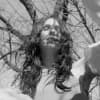When Chelsea Wolfe is giving it all that she's got, as on big, string-laden anthems like "House of Metal" and "The Waves Have Come," it's like her voice also contains something of a whisper within it, a tinge of breathy spaciousness that feels somehow kinesthetically continuous with the wide open, natural vistas that she's singing about. Her voice is less the human focal point of her new album, Pain Is Beauty, though, than the LP's instrumental center, the defining atmospheric element in a churning pool of moods and melodies that seems to always be on the verge of drowning in its own romantic oblivion—until it suddenly throws you for a new turn, that is. I spoke to Wolfe about her departure from the acoustic arrangements of her last full-length effort, Unknown Rooms, and why pain can be beautiful sometimes. The album is out now via Sargent House.
You’re returning to a more electronic palette this time around. What led to that decision? They’re actually songs that [synth and bass player] Ben [Chisholm]and I have been working on for 2 or 3 years now. We started doing electronic songs in the mindset that we would do a side project with them, and we didn’t really have time to do that. We just started playing them live in the Chelsea Wolfe project and decided that we wanted them to be Chelsea Wolfe songs, and we sort of re-approached them and added new life to them. And it’s really fun playing the electronic songs live as well, so that was part of the motivation.
What’s fun about it? It’s just a totally different energy. I’m so used to guitar-driven music. It still has guitar and drums driving it; it’s still a full band feel in my opinion. But having my hands free a lot and just being able to focus on singing and using my voice as an instrument is really new and interesting for me.
What aspects of vocal technique do you think about now that you didn’t think necessarily think about before? I don’t know. I think it’s just taking a song and kind of naturally going with what voice comes to me, like whether it’s something that’s more whispery and intimate or something that’s really loud and me singing with all my strength. I think there’s a few different kinds of voices on this album, and it’s kind of me exploring what my voice can do and what each song needs. I definitely like to try new things and experiment with new sounds, and I have always thought of the human voice as an instrument; that’s why I like to sing through pedals a lot.
What would you say that you took away from making the acoustic album? I suppose it was an exercise in keeping things minimal. I really love recording, so I love adding tons of harmonies and layers. The acoustic album was definitely my more folky, minimal songs, and it was an exercise in holding back and trying to keep them where they need to be and not making every song feel really epic. It was a lesson in simplicity.
How’d you come up with the album title, Pain Is Beauty? A lot of the songs on the album are about the intensity of nature: the way that nature affects humanity and the way that humanity affects nature. There’s this sense that there’s so many things we have to overcome, and so many processes that have to go through. It almost could have been titled “Pain Becomes Beauty,” because when you think about forest fires and things like that, it seems like such a terrible thing and it’s so harsh, but it really makes new room for growth to happen. It can be the same in our own lives—there’s always gonna be situations that we go through that are really hard and we just have to kind of be strong, and if we get through to the other side, then we become wiser people and our lives become more beautiful. There’s definitely a beauty on the other side of that transformation.
Are you someone who spends a lot of time in nature personally? I try to. It’s hard, living in LA and being really busy. I’m from Northern California. I really love it up there. I spent a lot of time when I was a kid in the giant redwoods and going to the river and the ocean and things like that, so I definitely try as many chances as I get to go back up to Northern California and free my mind—quiet my mind a little bit.
The press release for the album also mentions an exploration of ancestry. Is that referring to something in the deep past or something in the more recent, American past? I think a lot of it for me was this idea that maybe there’s so many unhappy people in America because we’re living on a land that is basically stolen from people who already lived here. There’s this sort of unrest that maybe still lives in the ground or the air; it’s kind of about energies. Also, most everyone that lives here comes from somewhere else. My own personal family is mostly Norwegian and Germanic. It’s kind of interesting to think about the mythology of our ancestors and wondering if it still kind of lingers in us somewhere—something that exists through the bloodline of a family. There’s one song that’s more specifically about it: the one that’s called “Ancestors, the Ancients.” It’s just something that’s been on my mind.
You’ve said that the songs on this album are some of the most honest songs you’ve written. What sort of soul-searching, beyond this ancestry idea, went into the making of this album? I don’t know if I think about it as “soul-searching,” but I think often times I write about things that are outside of myself. I write stories about other people’s lives, and I try and think about things from other people’s perspectives, but on this one I think there’s more songs that are more from my perspective, more from experience. There’s an honesty to this album that comes from somewhere inside of me that I wasn’t ready to expose in the past. I guess I just didn’t want to write a bunch of break-up albums, where I was talking about my personal life and things like that. I still don’t talk about my personal life very much. Even photo-wise, for the cover, I definitely covered myself up in different ways. This is the first album where you can fully see me, and I tried to be brave in that respect.
How do you usually write the lyrics? Do you come up with melodies first? It usually happens at the same time. I guess I’m always writing things down if I have some sort of idea in mind. A lot of times, it starts with a concept or a subject that I’m interested in—like I said, ancestry or the intensity of nature. One of the songs on the album is very directly inspired by the earthquake and tsunami that happened in Japan that there was so much footage of on TV; it was just so insane to watch that happen. And then I watched a documentary and a lot of it was first-hand footage; as soon as I watch something like that, it really just sticks in my head, and I ended up sitting down and writing a couple songs about that. I usually just write when information comes, and a lot of times the whole song comes at once, melody and words and everything. It’s not a conceptual album. There’s a lot of different things it’s about: it’s about ancestry, it’s about nature, it’s about tormented love and sort of overcoming the odds. There’s a lot of different themes on this album.
I want to hear more about the tormented love aspect. I think often sometimes people forget how much hardship can go into love and making love and a relationship work. I think it’s presented to us from the time we’re children as something that should be so easy and perfect and beautiful, but it actually takes a lot of patience and a lot of sweat and tears. So I guess I was trying to think of things from a more realistic side. Beyond that, it can be confusing, and you fall in and out of love, so there’s torment there.
Do you think it’s in expressing that torment that you can overcome it in some way? I suppose so. One of the songs was loosely inspired by the end of the book 1984. I read that book a long time ago, and I always hated that he gave his true love up. He was being tortured, and he was like, No, torture her. Put her in my place. I always hated that, and I wrote my own ending to it. There’s an idealism in me that you should be strong enough to fight for the one that you love and take pain for the one that you love. That’s my way of being romantic, I suppose. How love is so—just the way it’s presented in the media. It’s so gross these days. I don’t know if I want to get into it because I don’t like to comment on other people’s work or lives. But I think generally people might know what I mean when I say that.
Generally speaking, is there anything you want people to take away from this album? A few people who have heard it have commented that it feels very healing to listen to, and that was one of the highest compliments that I could receive, really. If someone can take that away from listening to the album—like a sense of healing and the sense that you’ve been able to overcome something—that’s really special to me.
Did you feel healing in making it? Yeah, I definitely think there was a process of healing for myself as well— just learning about the process of overcoming, as I’m writing about it. A lot of times I’ll write about things that I want to learn more about.


